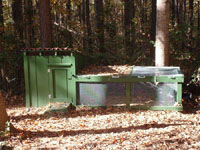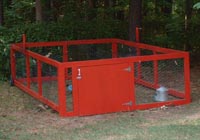Our adult ducks live in our backyard, in a secure house at night and in a movable grazing pen during the day. The grazing pen has a baby pool, which they use in lieu of a pond for bathing. When we’re home during the day, we also give them some "free range" time to roam the backyard. The grazing pen gives them enough room to move around comfortably while keeping them from tearing up the yard or the garden. (See my notes on backyard pasture.)
We manage their routine so that the bulk of the work is in the evening; all we have to do in the morning is move them, give them fresh food, and collect the eggs. This is much easier when you have to work off the homestead during the day. In total, managing the ducks takes less than ten minutes in the morning and ten to fifteen minutes in the evening, unless it’s time to clean out their pen.



